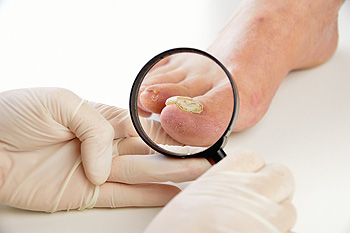Items filtered by date: May 2020
What Are My Next Steps When Diagnosed With Neuropathy?
 Peripheral neuropathy is a condition that impacts the nervous system, often causing complications with the feet. If the nerves in your feet become damaged, they are no longer able to regulate your body temperature, or signal pain as they normally would. Those afflicted with this condition relay experiencing tingling sensations, or numbness in their feet. Neuropathy can be common among diabetic patients, as they are more prone to having complications with their feet. This can be dangerous if wounds go undetected due to the lack of feeling in the feet, as it’s likely an infection may then form. If diagnosed with this condition, medication may be prescribed to help ease the common symptoms. Having a healthy diet, keeping your muscles active and strong, and regularly getting massages or acupuncture may also be helpful in relieving some of the symptoms. For a proper diagnosis and an advised treatment plan, it is suggested that you speak with a podiatrist for professional care.
Peripheral neuropathy is a condition that impacts the nervous system, often causing complications with the feet. If the nerves in your feet become damaged, they are no longer able to regulate your body temperature, or signal pain as they normally would. Those afflicted with this condition relay experiencing tingling sensations, or numbness in their feet. Neuropathy can be common among diabetic patients, as they are more prone to having complications with their feet. This can be dangerous if wounds go undetected due to the lack of feeling in the feet, as it’s likely an infection may then form. If diagnosed with this condition, medication may be prescribed to help ease the common symptoms. Having a healthy diet, keeping your muscles active and strong, and regularly getting massages or acupuncture may also be helpful in relieving some of the symptoms. For a proper diagnosis and an advised treatment plan, it is suggested that you speak with a podiatrist for professional care.
Neuropathy
Neuropathy can be a potentially serious condition, especially if it is left undiagnosed. If you have any concerns that you may be experiencing nerve loss in your feet, consult with one of our podiatrists from Advanced Ankle & Foot Surgeons. Our doctors will assess your condition and provide you with quality foot and ankle treatment for neuropathy.
What Is Neuropathy?
Neuropathy is a condition that leads to damage to the nerves in the body. Peripheral neuropathy, or neuropathy that affects your peripheral nervous system, usually occurs in the feet. Neuropathy can be triggered by a number of different causes. Such causes include diabetes, infections, cancers, disorders, and toxic substances.
Symptoms of Neuropathy Include:
- Numbness
- Sensation loss
- Prickling and tingling sensations
- Throbbing, freezing, burning pains
- Muscle weakness
Those with diabetes are at serious risk due to being unable to feel an ulcer on their feet. Diabetics usually also suffer from poor blood circulation. This can lead to the wound not healing, infections occurring, and the limb may have to be amputated.
Treatment
To treat neuropathy in the foot, podiatrists will first diagnose the cause of the neuropathy. Figuring out the underlying cause of the neuropathy will allow the podiatrist to prescribe the best treatment, whether it be caused by diabetes, toxic substance exposure, infection, etc. If the nerve has not died, then it’s possible that sensation may be able to return to the foot.
Pain medication may be issued for pain. Electrical nerve stimulation can be used to stimulate nerves. If the neuropathy is caused from pressure on the nerves, then surgery may be necessary.
If you have any questions, please feel free to contact our office located in O'Fallon, and New Baden, IL . We offer the newest diagnostic and treatment technologies for all your foot care needs.
Preventative Steps for People Who Must Stand for Work
 As many people know, there can be many transitions going into a new job. However, people who go from sitting to standing all day may have to make key adjustments. The first step in caring for your feet is making sure to wear the proper footwear. Shoes should fit your feet well, have cushioning, and mold to your feet. While it may be hard depending on the type of job, it is important to find a balance between sitting and standing, and breaks may be needed when a balance is not possible. However, if pain persists, it is important to consult with a podiatrist. By consulting with a podiatrist early on in the process, further and more severe injuries can be prevented.
As many people know, there can be many transitions going into a new job. However, people who go from sitting to standing all day may have to make key adjustments. The first step in caring for your feet is making sure to wear the proper footwear. Shoes should fit your feet well, have cushioning, and mold to your feet. While it may be hard depending on the type of job, it is important to find a balance between sitting and standing, and breaks may be needed when a balance is not possible. However, if pain persists, it is important to consult with a podiatrist. By consulting with a podiatrist early on in the process, further and more severe injuries can be prevented.
While working on the feet, it is important to take the proper care of them. For more information about working on your feet, contact one of our podiatrists from Advanced Ankle & Foot Surgeons. Our doctors will treat your foot and ankle needs.
Working on Your Feet
Standing on your feet for long periods of time can cause stress and pain in your feet. Your whole body may experience change in terms of posture, back pain, bunions, callouses and or plantar warts. There are ways to avoid these conditions with proper foot care, smart choices and correct posture.
Positive Changes
Negative heeled shoe – Choosing this shoe type places the heel slightly lower than the ball of the foot. These are great for overall foot health. Find shoes that fit you correctly.
Go barefoot – Our feet were not designed to be enclosed for all hours of the day. Try to periodically expose your feet to air.
Eliminate Pain
Foot Exercises – Performing simple exercises, incorporating yoga and doing stretches are beneficial. This will allow increased blood flow to the area and muscles of the foot.
Achilles tendon – Stretching the foot out flat on the floor will relax the calf muscles and tendon. These exercises can be performed almost anywhere. Make sure you add these exercises to your daily regimen.
With a little bit of this information and knowing more about foot health, you will notice changes. Foot stretches and proper footwear will help with pain and prevent further issues.
If you have any questions please feel free to contact our office located in O'Fallon, and New Baden, IL . We offer the newest diagnostic and treatment technologies for all your foot and ankle needs.
Common Signs of Toenail Fungus
 Toenail fungus is an unsightly foot condition that develops as a result of a fungal infection. This is considered to be contagious, and can be found in warm and moist environments. These often include public swimming pools, communal shower room floors, and locker rooms. Additionally, patients may develop this condition from having pedicures with tools that may not be properly disinfected. Existing medical conditions may lead to developing toenail fungus, which may consist of having diabetes, or a compromised immune system. If a toenail injury has occurred, it may weaken the nail, which may make it prone to contracting a fungus. Common symptoms that are associated with this ailment can include the toenail becoming thick and yellowed, and in severe cases, it may become brittle and fall off. It is suggested that if you see symptoms of a toenail fungus developing, that you speak to a podiatrist who can properly treat this condition.
Toenail fungus is an unsightly foot condition that develops as a result of a fungal infection. This is considered to be contagious, and can be found in warm and moist environments. These often include public swimming pools, communal shower room floors, and locker rooms. Additionally, patients may develop this condition from having pedicures with tools that may not be properly disinfected. Existing medical conditions may lead to developing toenail fungus, which may consist of having diabetes, or a compromised immune system. If a toenail injury has occurred, it may weaken the nail, which may make it prone to contracting a fungus. Common symptoms that are associated with this ailment can include the toenail becoming thick and yellowed, and in severe cases, it may become brittle and fall off. It is suggested that if you see symptoms of a toenail fungus developing, that you speak to a podiatrist who can properly treat this condition.
If left untreated, toenail fungus may spread to other toenails, skin, or even fingernails. If you suspect you have toenail fungus it is important to seek treatment right away. For more information about treatment, contact one of our podiatrists of Advanced Ankle & Foot Surgeons. Our doctors can provide the care you need to keep you pain-free and on your feet.
Symptoms
- Warped or oddly shaped nails
- Yellowish nails
- Loose/separated nail
- Buildup of bits and pieces of nail fragments under the nail
- Brittle, broken, thickened nail
Treatment
If self-care strategies and over-the-counter medications does not help your fungus, your podiatrist may give you a prescription drug instead. Even if you find relief from your toenail fungus symptoms, you may experience a repeat infection in the future.
Prevention
In order to prevent getting toenail fungus in the future, you should always make sure to wash your feet with soap and water. After washing, it is important to dry your feet thoroughly especially in between the toes. When trimming your toenails, be sure to trim straight across instead of in a rounded shape. It is crucial not to cover up discolored nails with nail polish because that will prevent your nail from being able to “breathe”.
In some cases, surgical procedure may be needed to remove the toenail fungus. Consult with your podiatrist about the best treatment options for your case of toenail fungus.
If you have any questions, please feel free to contact our office located in O'Fallon, and New Baden, IL . We offer the newest diagnostic and treatment technologies for all your foot care needs.

